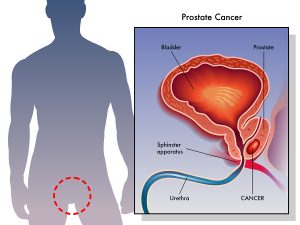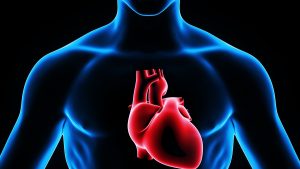Prostate cancer treatment is often inadequate when you follow the advice of conventional physicians. The gold standard for prostate cancer treatment is a radical prostatectomy. Below I am explaining that this often leads to recurrences of prostate cancer in the order of 25 to 35% when physicians follow patients for up to 10-years. There is, however, another method of diagnosing and treating prostate cancer, which reduces the recurrence rate to only 6% at 10 years of follow-up. I will first explain the process of the initial assessment of prostate cancer, and then describe different treatment modalities.
Which prostate cancer biopsy method is superior?
Standard biopsy method
The standard biopsy method consists of 6 to 16 random biopsies via the transrectal approach. However, this approach has two downfalls. One is the danger of infection. The rectum is full of E. coli bacteria, which then can spread into the bloodstream. This can cause septicemia in 1 out of 200 biopsies, which is a medical emergency. The treatment consists of with high doses of antibiotics. The second problem is that the standard biopsy method misses 25 to 35% of prostate cancers. But it may take up to 10 years to show up as a prostate cancer recurrence. A careful study by the John Hopkins University, Cleveland, OH still showed a 23% recurrence after 10 years. Conventional specialists tend to downplay this long-term risk, but all of the publications that I have reviewed in my book show similar poor long-term results.
3-dimensional mapping biopsy
The interventional radiologist, Dr. Gary Onik from Ft. Lauderdale, invented the 3-dimensional mapping biopsy. In this case the specialist inserts needles through a brachytherapy grid over the perineum, the skin between the scrotum and the anus. The physician disinfects the area thoroughly, which eliminates the risk of infection with placement of the needles. The patient is under a general anesthetic, and the specialist inserts between 60 and 90 biopsy needles through the perineum into the prostate gland depending on the prostate gland size. The physician probes the entire prostate gland using biopsy needles, and this procedure does not miss any area of cancer. The surgeon can observe the procedure through a transrectal ultrasound (TRUS) probe. He labels the biopsies carefully and keeps track of them, so he can enter the results from the pathologist on a map, (hence the name mapping biopsy).
Better resolution with 3-dimensional biopsies versus TRUS guided rectal biopsies
The end result is like a geographical image of the areas where tests picked up prostate cancer. It is a computer generated ultrasound image of the patient’s prostate gland with overlaying histology results. Because of the higher number of biopsy needles used with mapping biopsies the resolution is much better in comparison to the TRUS guided rectal biopsies. It also tells the treating physician exactly the location of the cancer, which is important, if there is a plan to treat with ablative cryotherapy. Dr. Onik has published a 10-year follow-up of 70 prostate cancer patients treated in this way. 100% of the prostate cancer patients who had cryotherapy survived. 94% were completely free from any recurring prostate cancer. 6% had recurrent disease. These kinds of statistics are unheard of with other treatment modalities. The patients’ ages were between 45 and 77 years at the time of surgery.
My own personal experience with prostate cancer
As I have explained in my book entitled “Prostate Cancer Unmasked”, I was diagnosed with prostate cancer in early 2016. An elevation of my blood PSA (prostate specific antigen) tests started the search for the optimal prostate cancer treatment. I started reviewing the medical literature to see what was the most optimal survival with the least possible side effects. This is how I came across the name of Dr. Gary Onik who has been a pioneer of prostate cancer research for decades. The extremely low prostate cancer relapse data after 10 years of follow-up impressed me. I decided to receive a treatment by him in Ft. Lauderdale, FLA. I had the 3-D prostate biopsy involving 96 biopsy needles (due to an enlarged prostate gland, called prostate hypertrophy).
Ablation cryotherapy
One month later he treated me with ablation cryotherapy, which is the equivalent of a lumpectomy for breast cancer in women. Since then (Aug. 17, 2016) my 3 monthly PSA levels have stayed extremely low meaning that there is no recurrence of prostate cancer. I also have tested negative using the Oncoblot test, an extremely sensitive cancer test that had been positive prior to the prostate cancer surgery.
Combination treatment with ablation cryotherapy and IRE surgery
Dr. Onik told me that he wanted to use two procedures simultaneously in my case to treat my lesions optimally. His concern was the neurovascular bundles that cross through the outer aspect of each lobe of the prostate to the penis. The ablation cryotherapy could destroy them, if he came too close to them, which would result in sexual problems. On the other hand he needed to treat the prostate cancer until all of the cancer cells were dead. The surface antigens would still be intact and would stimulate my immune system to destroy any remaining prostate tumor cells. Dr. Onik has done extensive research regarding the immune response in prostate cancer patients and he was working on a publication in end-stage cancer patients.
There was a second procedure, FDA approved 4 years ago, namely IRE surgery.
IRE surgery
Another technique pioneered by Dr. Onik is the NanoKnife or irreversible electroporation (IRE surgery).
This is another tumor ablation method using high voltage electrical impulses that put nano-sized holes into cancer cells, but not into surrounding healthy tissue.
Dr. Onik has been pioneering this procedure on prostate cancer patients, but he has also shown in liver cancer that these methods can double the survival rates, compared to conventional treatment methods. This method kills cancer cells, and the released surface antigens of cancer cells stimulate the immune system to further the healing. The interesting finding in Dr. Onik’s past research regarding the IRE surgery showed that the neurovascular bundle shows no damage from the IRE surgery within the prostate. With the two lesions in my right prostate lobe Dr. Onik wanted to use mainly IRE surgery, because they were in closer proximity to the neurovascular bundle.
Summary regarding mapping biopsy and prostate surgery
There are several points that impressed me with ablation cryotherapy.
Mapping biopsy
It starts with the mapping biopsy, which gives an exact histological picture of any prostate cancer in your prostate. This provides the roadmap for the surgeon to treat any lesions within the prostate with ablation cryotherapy that the biopsy located. During the biopsies there is transrectal ultrasound guidance (TRUS) using a rectal probe. This helps to locate the cancer 3- dimensionally.
Ablation cryotherapy
Like the mapping biopsy the physician does the ablation cryotherapy under general anesthetic. He treats the same lesions from the mapping biopsy with special Argon sounds, and temperature probes measure the temperature to make sure that the freezing action was long enough to destroy the tumor. This is repeated one more time to be certain that all cancer cells are killed.
IRE or also called NanoKnife
For cancer lesions too close to the neurovascular bundle to be removed with cryotherapy, the surgeon can use the alternative, IRE or also called NanoKnife. It had been researched in dogs and later in humans that it will eradicate cancer cells, but not normal cells. It also does not attack the neurovascular bundle. Between the two procedures the entire cancer within the prostate can be removed safely.
Erectile dysfunction is only temporary
This means that the side effects are much less than with conventional prostate surgery. The erectile dysfunction is only temporary for 3 to 5 months, but Cialis and/or Viagra can be titrated to achieve normal sex until your own erections come back. There is no effect on the rectum and no sign of bladder leakage. Problems urinating are only temporary in the beginning and can be overcome with self-catheterization or with an indwelling catheter for a period of time. The end result is that the patient is back to normal, and the prostate cancer is removed.
Conclusion
I compared all of the other prostate cancer procedures to ablation cryotherapy. My conclusion was that ablation cryotherapy was the best solution for me. It is straightforward, cancer specific and works with the least amount of damage to the normal surrounding tissue. The 10-year survival was 100% with a tumor free rate of 94%. There is another advantage: anytime there is a PSA elevation in the follow-up blood tests, the mapping biopsy can be repeated. If there is a recurrent cancer, the treating physician can repeat the ablation cryotherapy again.
Reference: https://www.amazon.com/Prostate-Cancer-Unmasked-Ray-Schilling/dp/1542880661








